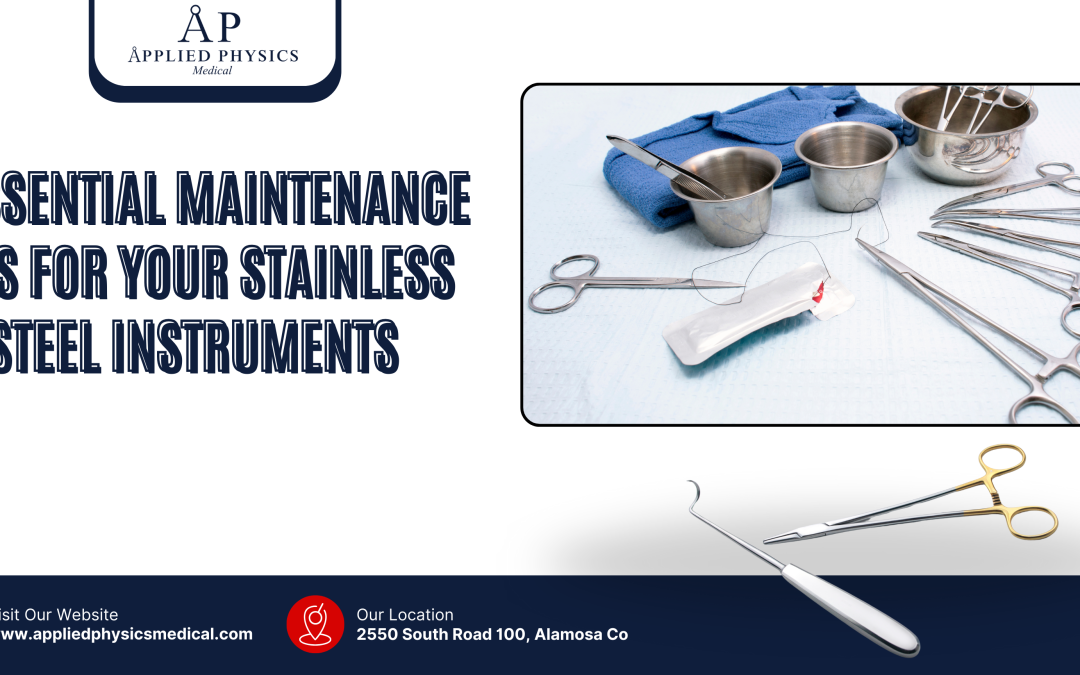Introduction
Stainless steel instruments are known for their durability and resistance to corrosion, but they still require regular cleaning and polishing to maintain their appearance and performance. One of the most important maintenance tips is to clean them regularly with a mild detergent and warm water. This will help remove any dirt, grime, or residue that may have accumulated on the surface of the instruments.
After cleaning, it is important to dry the instruments thoroughly to prevent water spots or stains from forming. In addition to regular cleaning, it is also important to polish to maintain their luster and shine. There are many stainless steel polish products available on the market that can help restore the finish of the instruments and protect them from tarnishing.
When polishing stainless steel instruments, it is important to use a soft, non-abrasive cloth to avoid scratching the surface. By regularly cleaning and polishing your, you can ensure that they remain in top condition and continue to perform at their best. Utilizing specialized stainless steel cleaners can enhance the shine and remove stubborn stains. Consistent care not only maintains their appearance but also prevents corrosion, extending the life of your instruments.
Key Takeaways
- Regular cleaning and polishing are essential for maintaining the appearance and longevity of stainless steel instruments.
- Proper storage and handling can prevent scratches and damage to the instruments.
- Avoiding corrosive substances such as harsh chemicals and acidic solutions can help prevent corrosion and damage to the instruments.
- Maintaining sharpness and cutting edge is important for the effectiveness of the instruments and can be achieved through proper sharpening techniques.
- Rust prevention and removal are crucial for preserving the quality of stainless steel instruments, and choosing the right cleaning products is key to achieving this.
Proper Storage and Handling
Proper storage and handling are essential for maintaining their quality and longevity. When not in use, it is important to store stainless steel instruments in a clean, dry environment to prevent moisture and humidity from causing corrosion or tarnishing. It is also important to store the instruments in a way that prevents them from coming into contact with other metal objects that could cause scratches or damage.
When handling stainless steel instruments, it is important to use caution and care to avoid dropping or mishandling them. Dropping can cause dents, scratches, or other damage that can affect their performance and appearance. It is also important to avoid using excessive force when using the instruments, as this can cause unnecessary wear and tear.
By properly storing and handling you can help prolong their lifespan and ensure that they continue to perform at their best. Regular maintenance prevents damage and wear, keeping them in optimal condition. Using protective cases or covers can further safeguard against environmental factors. Additionally, training staff on correct handling techniques reduces the risk of accidental damage, ensuring the instruments remain reliable and efficient over time.
Avoiding Corrosive Substances
Another essential maintenance tip for stainless steel instruments is to avoid exposing them to corrosive substances that can cause damage or deterioration. Corrosive substances such as acids, bleach, or harsh chemicals can cause pitting, staining, or corrosion on the surface of stainless steel instruments. It is important to be mindful of the environment in which the instruments are used and to take precautions to prevent exposure to these corrosive substances.
In addition to avoiding direct contact with corrosive substances, it is also important to clean and dry stainless steel instruments promptly after they have come into contact with any potentially harmful materials. This will help prevent any damage from occurring and ensure that the instruments remain in top condition. By being mindful of the potential risks of exposure to corrosive substances and taking proactive measures to prevent damage, you can help maintain the quality and performance of your stainless steel instruments.
Maintaining Sharpness and Cutting Edge
| Tip Number | Maintenance Tip |
|---|---|
| 1 | Regularly clean with mild soap and water |
| 2 | Avoid using abrasive cleaners or pads |
| 3 | Use stainless steel polish for extra shine |
| 4 | Inspect for any signs of rust or corrosion |
| 5 | Store in a dry and clean environment |
Maintaining the sharpness and cutting edge of stainless steel instruments is crucial for ensuring their effectiveness and precision. Over time, the cutting edges of instruments such as scissors, scalpels, or forceps can become dull or worn down, which can affect their ability to perform their intended function. To maintain the sharpness of stainless steel instruments, it is important to regularly sharpen them using a sharpening stone or tool designed specifically for this purpose.
In addition to sharpening the cutting edges, it is also important to regularly inspect the overall condition of the instruments to identify any signs of wear or damage. If any issues are identified, it is important to address them promptly to prevent further deterioration and ensure that the instruments continue to perform at their best. By maintaining the sharpness and cutting edge of your stainless steel instruments, you can ensure that they remain effective and reliable for their intended use.
Rust Prevention and Removal
Rust is a common issue that can affect stainless steel instruments if they are not properly maintained and cared for. Rust can develop on the surface of stainless steel instruments when they are exposed to moisture or humidity for extended periods. To prevent rust from forming on your stainless steel instruments, it is important to store them in a dry environment and to regularly inspect them for any signs of corrosion.
If rust does develop on your stainless steel instruments, it is important to address it promptly to prevent further damage. There are many rust removal products available on the market that can help safely remove rust from stainless steel surfaces without causing damage. It is important to follow the manufacturer’s instructions when using these products to ensure that they are used safely and effectively.
By taking proactive measures to prevent rust and addressing any issues promptly, you can help maintain the quality and appearance of your stainless steel instruments. Regular inspections and immediate action against any signs of corrosion are essential. Additionally, using appropriate storage solutions will further protect your instruments from environmental factors that may contribute to rust formation.
Choosing the Right Cleaning Products
When it comes to maintaining stainless steel choosing the right cleaning products is essential for ensuring that they remain in top condition. It is important to use mild detergents and non-abrasive cleaning products that are specifically designed for use on stainless steel surfaces. Using harsh or abrasive cleaning products can cause damage or scratching on the surface of the instruments, which can affect their appearance and performance.
In addition to choosing the right cleaning products, it is also important to use soft, non-abrasive cloths or sponges when cleaning stainless steel. This will help prevent scratching or damaging the surface of the instruments while ensuring that they are thoroughly cleaned. By using the right cleaning products and tools, you can help maintain the quality and appearance of your stainless steel instruments for years to come.
Professional Maintenance and Servicing
While regular cleaning and maintenance are essential for keeping stainless steel instruments in top condition, there are some tasks that are best left to professionals. Professional maintenance and servicing of stainless steel instruments can help ensure that they are properly cared for and maintained according to industry standards. This can include tasks such as sharpening cutting edges, inspecting for wear or damage, and addressing any issues that may arise.
Professional maintenance and servicing can also help identify any potential issues with your stainless steel instruments before they become more serious problems. By having your instruments professionally serviced regularly, you can help prolong their lifespan and ensure that they continue to perform at their best. It is important to work with a reputable and experienced professional who has expertise in caring to ensure that they receive the best possible care.
Conclusion
Maintaining stainless steel instruments requires regular cleaning and polishing, proper storage and handling, avoiding corrosive substances, maintaining sharpness and cutting edge, rust prevention and removal, choosing the right cleaning products, and professional maintenance and servicing. By following these essential maintenance tips, you can help ensure that your stainless steel instruments remain in top condition and continue to perform at their best for years to come. Consistent care not only extends the lifespan of the instruments but also enhances their safety and reliability. Implementing a routine maintenance schedule can prevent costly replacements. Moreover, well-maintained instruments reflect professionalism and commitment to quality. Ultimately, protecting your investment in stainless steel tools ensures they are always ready to meet the demands of your work.


